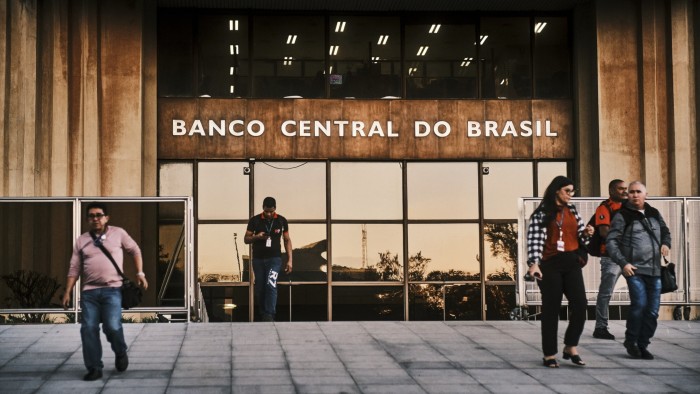Unlock the White House Watch newsletter for free
Your guide to what the 2024 US election means for Washington and the world
A strong dollar under US president-elect Donald Trump could wreck returns in emerging market bonds, say investors, driving further outflows from a sector already hit by a lengthy period of high interest rates in developed economies.
Investors have pulled nearly $5bn overall from funds investing in dollar and local currency denominated emerging market bonds this month as of mid-November, taking this year’s total net outflows to more than $20bn, according to data from JPMorgan. That comes after withdrawals of $31bn last year and $90bn in 2022.
Global markets have been dominated by so-called “Trump trades” in recent weeks, as expectations that his policies of tax cuts and tariffs will fuel inflation, pushing the dollar and Treasury yields higher.
Analysts and investors warn that US tariffs could exert downward pressure on emerging market currencies — as demand for their exports falls — wiping out debt investors’ returns in dollar terms.
“All of this is going to be negative for emerging markets,” said Paul McNamara, an emerging market debt manager at fund firm GAM. “I don’t think it is fully in the price.”
Local currency bond markets are dominated by countries such as Mexico, Brazil and Indonesia, which have largely moved beyond having to borrow in US dollars in recent decades as falling barriers to global trade benefited their economies and made them more trustworthy credits.
This year investors had been betting that many such countries were primed to cut rates, a move likely to support bond prices, ahead of the US Federal Reserve. Their central banks had moved earlier than developed peers to raise rates when global inflation surged following the coronavirus pandemic.
But that trade has been turned on its head by Trump’s election victory earlier this month. Markets have moved to price in expectations that US interest rates will have to stay higher for longer if the tariffs and planned tax cuts under Trump stoke US inflation.
Yields on 10-year Treasuries have risen from 4.29 to 4.39 per cent since Trump’s election win, while the 30-year yield is up from 4.45 per cent to 4.58 per cent.
The dollar meanwhile is up more than 4 per cent against a basket of currencies. South Africa’s rand is down nearly 4 per cent against the greenback while the Mexican peso and Brazilian real are off about 2 per cent.
Higher US rates would make investing in riskier markets abroad relatively less attractive compared with the US, pushing their central banks to increase their own rates to draw in capital.
Brazil’s central bank picked up the pace of rate rises this month while the South African Reserve Bank struck a cautious tone on policy even as it cut rates this week from a twenty-year high in real terms. If protectionism worldwide “does become inflationary, you would expect that globally, central banks will react”, Lesetja Kganyago, the bank’s governor said at a press conference following the decision.
The mood is one of “resignation” rather than outright crisis, said Gabriel Sterne, head of global emerging markets research at Oxford Economics. “You are in for a stronger dollar, and that puts a brake on emerging market local currency returns.”
A JPMorgan index of emerging-market local currency bond returns has fallen into the red for this year and is down around 1 per cent.
However, others argue that the new US administration’s platform will eventually add up to a weaker dollar over time.
“The preferences across fiscal policy, monetary policy, trade policy and exchange rate outcomes are incompatible with each other,” said Karthik Sankaran, senior research fellow at the Quincy Institute for Responsible Statecraft and an FX veteran, pointing to a recipe for a weaker dollar.
“We have been in environments before where the dollar traded ‘EM-esque’ — where [US] bond yields went up, and the dollar went down.”
But, Sankaran added, a weaker dollar may not show up soon enough for many emerging markets to avoid exchange rate pressures. “The problem is that in a lot of these countries, the exchange rate is a significant component of financial conditions, in a bad way.”
Pimco, one of the world’s biggest emerging market debt managers, recently argued that the days of investors consistently making money with big macro bets on high-yielding countries are over.
Emerging market bonds “should be used primarily as a diversification tool — rather than a source of seeking high returns”, it said in a paper published last month.
It also questioned whether surges in volatility meant having freely floating currencies against the dollar has been the right policy for emerging economies and investors over time.
Alongside classic IMF-endorsed policies such as inflation targeting and fiscal rules to control debts, free floats have been seen as beneficial by emerging market investors for decades, as opposed to fixed pegs or managed floats that suppress moves against the dollar through intervention.
“There is a question mark about what a flexible exchange rate regime is doing for many markets,” such as Mexico and Brazil, said Pramol Dhawan, head of Pimco’s emerging markets team. “What worked in the early 2000s has not worked in the last 15 years and will not work again in the future.”
Read the full article here

